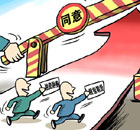-
-
China Daily E-paper
Highlights
Stop energy giants from corruption
By Fu Jing (chinadaily.com.cn)
Updated: 2010-01-28 11:36
 |
Large Medium Small |
The new National Energy Commission, which was launched on Wednesday, is expected to play a supervisory role for the country's colossal energy giants to fulfill their responsibilities in guaranteeing the country's energy security, instead of making easily-earned hefty monopolistic profit only.
This is an urgent calling despite that this long-stalled announcement of the new agency, which Premier Wen Jiabao heads, has been interpreted by some observers as the Chinese government's determination to ramp up efforts to turn the goal of 40-45 percent carbon intensity reduction by 2020 from 2005 level into the reality.
| ||||
China’s highest parliamentary body has approved to set up such agency in the beginning of 2008 and Vice-Premier Li Keqiang serves as deputy and more than 20 ministers as commission members. The announcement coincided with the deadline 31 January when all the countries are required by UN to submit their binding or voluntary cutting targets of greenhouse gases emission by 2020.
Truly, as the deadline draws close, Premier Wen and his colleagues should take lead in indicating the country's role as a responsible global stakeholder in the earth, which suffers from not only global warming, but also the painful shortage of fossil fuels.
However, the agency's role, though there are little details so far, should definitely go beyond that. From energy resource deregulation, energy infrastructure expansion, energy conservation and scientific research, the commission should shoulder millions tons of responsibility.
But if Premier Wen, Vice-Premier Li and the ministers pay a visit to all the headquarter office buildings of the country's oil, electricity and nuclear State-owned enterprises, they will be surprised how these magnificent and sky-high buildings dominate their offices in Zhongnanhai, an administrative compound of China's leadership in Beijing.
And then the most-powerful coordinating agency may find their priority this year is not to draw a blueprint for China's sustained energy supply. Instead, they should investigate whether these buildings are properly built and to what extent the corruption lies behind them.
This is a challenging test for the new agency. However, only those clean, devoted and responsible energy enterprises and businesses leaders can fulfill the demanding role of energy security entrusted by the populous country.
So, the Premier and his colleagues can put aside their long-term program for a while and start their mission from investigating whether the SOEs have used their monopolistic power properly.












